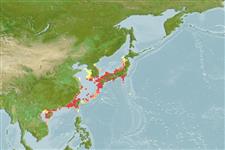Common names from other countries
>
Eupercaria/misc (Various families in series Eupercaria) >
Labridae (Wrasses)
Etymology: Pseudolabrus: Greek, pseudes = false + Greek, labrax = a fish, Dicentrarchus labrax (Ref. 45335); japonicus: Specific epithet refers to the country of origin of Houttuyn's type specimens..
Environment: milieu / climate zone / depth range / distribution range
पारिस्थितिकी
समुद्री प्रवाल-भित्ति संयुक्त. Tropical
Northwest Pacific: central Honshu to Okinawajima in Japan; South Korea, southern China, Taiwan, and Hong Kong.
आकार / वज़न / Age
Maturity: Lm ? range ? - ? cm
Max length : 25.0 cm TL पुल्लिंग / अलिंग; (Ref. 559)
Retires under low rock ledges at night. Feeds mainly on small benthic organisms (small crustaceans, mollusks and polychaete worms, sponges, coral polyps). Hibernates in the sand in winter.
Life cycle and mating behavior
परिपक्व अवधि | पुनरुत्पत्ति | मछलीऔ का अंडे देना | अंडे | Fecundity | लार्वा
Pelagic spawner.
Russell, B.C., 1988. Revision of the labrid fish genus Pseudolabrus and allied genera. Rec. Aust. Mus. (Suppl. 9):1-72. (Ref. 26203)
IUCN Red List Status (Ref. 130435)
CITES (Ref. 128078)
Not Evaluated
Threat to humans
Harmless
Human uses
जलजीवालय: व्यापारिक
अधिक जानकारी
संदर्भजलीयकृषिजलीयकृषि रूपरेखाखींचआनुवंशिकीElectrophoresesहैरेटिबिलटीबीमारीप्रक्रमणMass conversion
सहयोगीयोतस्वीरेStamps, Coins Misc.ध्वनिसिगुयटिरारफ्तारतैरने के प्रकारगिल क्षेत्रOtolithsदिमागदृष्टि
साधन
Special reports
Download XML
इंटरनेट स्रोत
Estimates based on models
Preferred temperature (Ref.
115969): 17.6 - 26.9, mean 22.8 (based on 267 cells).
Phylogenetic diversity index (Ref.
82804): PD
50 = 0.5002 [Uniqueness, from 0.5 = low to 2.0 = high].
Bayesian length-weight: a=0.01995 (0.00922 - 0.04317), b=2.99 (2.79 - 3.19), in cm Total Length, based on LWR estimates for this (Sub)family-body shape (Ref.
93245).
Trophic level (Ref.
69278): 3.1 ±0.35 se; based on food items.
लौटाव (Ref.
120179): माध्यम, न्यूनतम जनसंख्या दुगनी होने का समय 1.4 - 4.4 वर्ष। (Preliminary K or Fecundity.).
Fishing Vulnerability (Ref.
59153): Low vulnerability (15 of 100).
